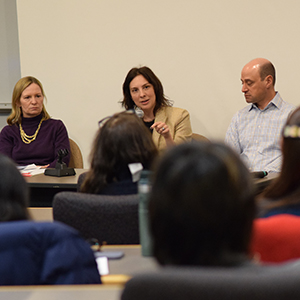2023 in Review
IPR’s top articles cover the pandemic’s lingering impact, new leadership, innovative studies, and engaging policy dialogue
Get all our news
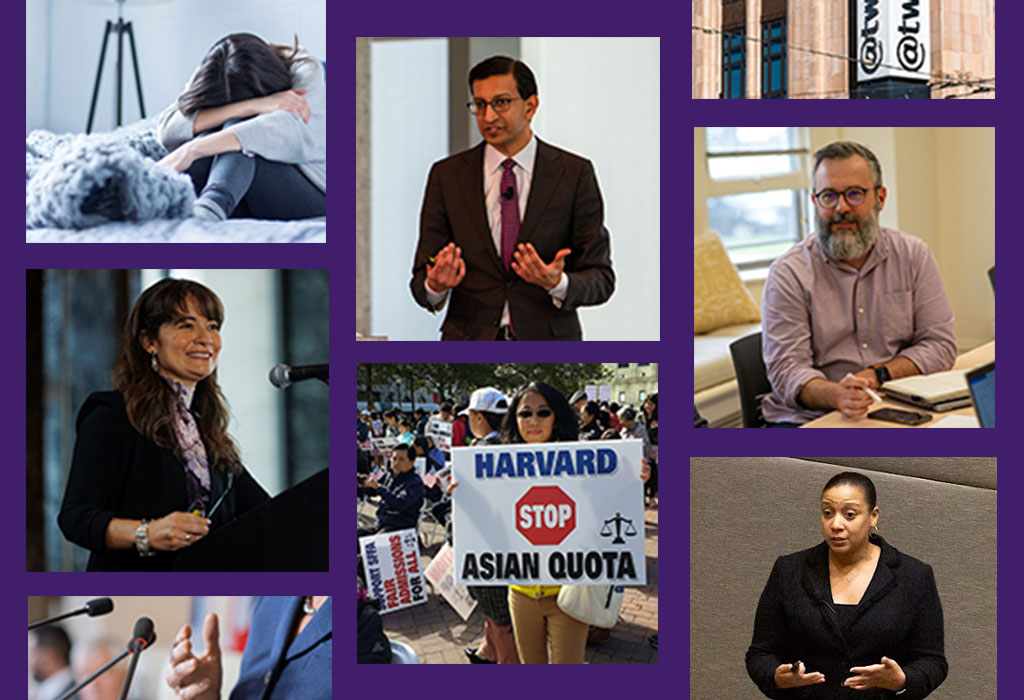
While the World Health Organization officially declared an end to the global pandemic in 2023, concerns about the COVID-19 pandemic’s lingering effect remain clear in IPR’s top stories about mental health and education outcomes for children and teenagers. Others highlighted critical research-driven policy conversations on upward mobility, perceptions of racial progress, affirmative action, and gun violence, along with research stories about the direction of X (formerly known as Twitter) and whether voters are biased against female candidates.
Read more about IPR’s top stories in 2023.
As Social Lives Resume, A Mental Health Crisis Continues
How Has COVID-19 Affected Children and Adolescents?
The Past and Future of Affirmative Action in College Admissions
Twitter Use Dips After Elon Musk’s Takeover, Largely Driven by Democrats’ Departure
Are Voters Biased Against Women Candidates?
‘Puncturing’ the Narrative of Racial Progress
Andrew Papachristos Tapped to Become IPR’s Next Director
‘We Are Making the City Safer’
Universal Pre-K Expansion in Chicago Led to More Full-Time Pre-K Enrollment
As Social Lives Resume, A Mental Health Crisis Continues

Nearly three years into the pandemic, young adults are returning to their pre-pandemic social lives. Yet a mental health crisis among America’s young adults persists, according to a recent national survey by the COVID States Project. The survey confirms the pandemic’s lingering impact on mental health for all Americans, but in particular for young adults: While 18- to 24-year-olds say they are going out more, their overall levels of depression have not fallen as much as one would have expected with the lifting of pandemic restrictions. “This is really concerning. During the pandemic, many hoped that these numbers, among young people in particular, would decline but we are seeing no change,” said IPR political scientist James Druckman, who co-authored the report. “This could reflect trauma from experiencing the pandemic at a key point of socialization.”
How Has COVID-19 Affected Children and Adolescents?
Since the World Health Organization declared COVID-19 a worldwide pandemic in 2020, the world’s youth have experienced lockdowns and upheavals in their school, work, and social activities. Headlines have increasingly warned about substantial learning losses and critical mental health crises. Three IPR fellows discussed their research about the effect of the pandemic and pandemic-related school policies on children. IPR developmental psychologist Terri Sabol explained that responsive federal policies kept childcare centers open, while IPR economist Jonathan Guryan discussed the learning losses that hit low-income and Black and Hispanic students the hardest. IPR developmental psychobiologist Emma Adam shared how adolescents and young adults were struggling with mental health issues before the pandemic, which increased for young adults because of financial uncertainty.
The Past and Future of Affirmative Action in College Admissions
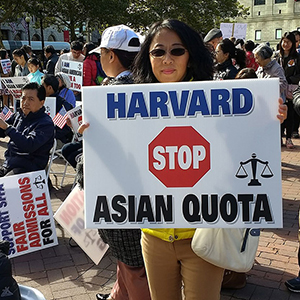
The U.S. Supreme Court ruled in June that Harvard University and the University of North Carolina violated the Constitution’s guarantee of equal protection by using race as a factor in college admissions. Some colleges and universities use race as a factor in admissions, along with other factors like athletics and activities, to create a diverse student body. Now, they must find other ways to ensure diversity in new classes. IPR spoke with sociologist Anthony Chen, an expert on affirmative action in higher education, about the court case. After it was handed down, Chen noted, “Universities are responding in a range of ways. While racial group membership per se cannot count, many institutions have indicated that they will consider applicants’ discussions of their racial background in a manner consistent with SFFA’s insistence that such discussions are used to shed light on applicants’ individual qualities, such as their grit or perseverance.”
Twitter Use Dips After Elon Musk’s Takeover, Largely Driven by Democrats’ Departure
 After Elon Musk bought Twitter in 2022, the platform experienced several tumultuous months under his leadership at the start. His controversial decisions to lay off a significant portion of the workforce, temporarily suspend several journalists’ accounts, and restore previously banned accounts roiled Twitter at the time. A national survey conducted by IPR political scientist James Druckman and his COVID States Project co-authors before and after Musk’s takeover of Twitter shows that its use dipped from around 32% of Americans in October 2022 to 30% by January 2023. The decrease was largely driven by Democrats who left the platform, with 38% reporting they used it before Musk bought Twitter but only 33% reporting that they used it after he bought it. The survey also showed partisan differences in Americans’ trust of Musk.
After Elon Musk bought Twitter in 2022, the platform experienced several tumultuous months under his leadership at the start. His controversial decisions to lay off a significant portion of the workforce, temporarily suspend several journalists’ accounts, and restore previously banned accounts roiled Twitter at the time. A national survey conducted by IPR political scientist James Druckman and his COVID States Project co-authors before and after Musk’s takeover of Twitter shows that its use dipped from around 32% of Americans in October 2022 to 30% by January 2023. The decrease was largely driven by Democrats who left the platform, with 38% reporting they used it before Musk bought Twitter but only 33% reporting that they used it after he bought it. The survey also showed partisan differences in Americans’ trust of Musk.
Are Voters Biased Against Women Candidates?
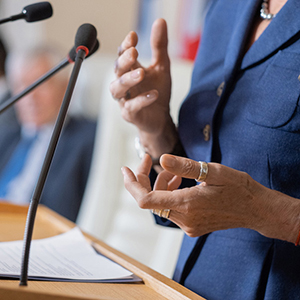 The partisan gender gap between female elected officials has increased since the 1990s as more Democratic women win seats in state legislatures and Congress, while the number of Republican women elected to office has remained flat. In a study published in Political Behavior, IPR political scientist Mary McGrath and Sara Saltzer (BA 2019), explore why this partisan difference exists and what role voter bias may play in the gender gap. In addition to the fact that fewer Republican women run for elected office, they show the gap is due in part to partisan voters’ choices at the primary election stage. Registered partisans reproduce this gender-preference gap in experimental surveys, with Democrats showing a greater preference for female candidates than Republicans.
The partisan gender gap between female elected officials has increased since the 1990s as more Democratic women win seats in state legislatures and Congress, while the number of Republican women elected to office has remained flat. In a study published in Political Behavior, IPR political scientist Mary McGrath and Sara Saltzer (BA 2019), explore why this partisan difference exists and what role voter bias may play in the gender gap. In addition to the fact that fewer Republican women run for elected office, they show the gap is due in part to partisan voters’ choices at the primary election stage. Registered partisans reproduce this gender-preference gap in experimental surveys, with Democrats showing a greater preference for female candidates than Republicans.
Restoring the American Dream
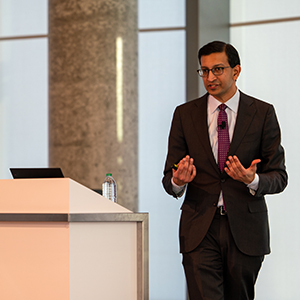
In his IPR Distinguished Public Policy Lecture, Harvard economist Raj Chetty discussed his research to systematically trace "the dramatic fading of the American Dream" by pairing big data with innovative models and methodology. Chetty shared the dramatic contrast of the upward mobility of children born in 1940 to those born in the 1980s in the U.S. "For kids born in the middle of the last century, it was a virtual guarantee that you were going to achieve the American dream of moving up," he said, with 92% of children going on to earn more than their parents. Yet four decades later, that figure dropped to just 50%. This change reflects a "fundamental change" in the U.S. economy, he continued, with critical implications for U.S. society, politics, and elections.
‘Puncturing’ the Narrative of Racial Progress
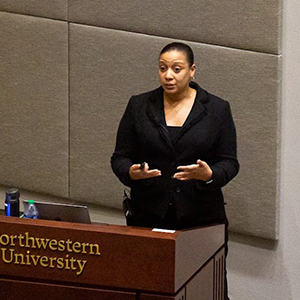 The abolition of slavery, repeal of Jim Crow laws, and election of the first Black president bolster a narrative of progress toward racial equality that Americans want to believe in. Yet in her IPR Distinguished Public Policy Lecture, Yale social psychologist Jennifer Richeson discussed her research examining how this myth of linear, natural, automatic racial progress over time in the United States distorts our perceptions and influences our expectations. Richeson pointed to Americans’ belief that as a country, racial equality is automatically getting better in a largely linear fashion over time. While American society acknowledges the periods of history that blemish that timeline, such as slavery and Jim Crow laws, it also continues to embrace a belief that, with a few corrective measures, the country gets back on track and racial progress begins to unfold naturally yet again.
The abolition of slavery, repeal of Jim Crow laws, and election of the first Black president bolster a narrative of progress toward racial equality that Americans want to believe in. Yet in her IPR Distinguished Public Policy Lecture, Yale social psychologist Jennifer Richeson discussed her research examining how this myth of linear, natural, automatic racial progress over time in the United States distorts our perceptions and influences our expectations. Richeson pointed to Americans’ belief that as a country, racial equality is automatically getting better in a largely linear fashion over time. While American society acknowledges the periods of history that blemish that timeline, such as slavery and Jim Crow laws, it also continues to embrace a belief that, with a few corrective measures, the country gets back on track and racial progress begins to unfold naturally yet again.
Andrew Papachristos Tapped to Become IPR’s Next Director
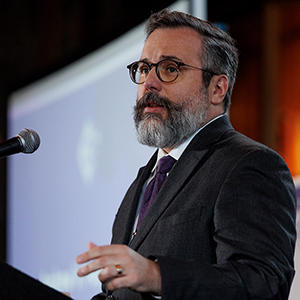
Northwestern University appointed prominent sociologist Andrew Papachristos director of its Institute for Policy Research and the John G. Searle Professor of Sociology, on September 1. An IPR fellow since 2018, Papachristos is widely recognized for his pioneering and policy-relevant research deploying network science in rigorous and interdisciplinary examinations of police misconduct, gun violence, and neighborhood inequality in urban America. He is also actively involved in the evaluation of gun violence prevention programs in several U.S. cities. “I’m truly honored to be a part of IPR’s history of using research to help build safe, healthier, and more equitable communities and developing new directions for the Institute’s and Northwestern’s work in this and other exciting new areas,” he said.
‘We Are Making the City Safer’
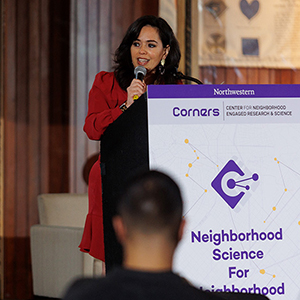 While addressing gun violence can sometimes feel like a hopeless effort, an approach centered on community violence intervention, or CVI, where trained interventionists connect with those most at risk for perpetuating the cycle of gun violence, points to a path forward. At a symposium discussing CVI research and practices, Papachristos, who co-directs CORNERS, the Center for Neighborhood Engaged Research & Science, pointed to citywide collaboration as preventing at least 383 homicides and shootings from 2017–21. Those efforts are taking place in Chicago neighborhoods through engaged community and civic partnerships. Arne Duncan, former U.S. Secretary of Education, discussed how most violence in Chicago is not random. “There is a story, multiple stories, behind almost every shooting. You just have to know the community to understand what's happening, to try and track that and stop the next one.”
While addressing gun violence can sometimes feel like a hopeless effort, an approach centered on community violence intervention, or CVI, where trained interventionists connect with those most at risk for perpetuating the cycle of gun violence, points to a path forward. At a symposium discussing CVI research and practices, Papachristos, who co-directs CORNERS, the Center for Neighborhood Engaged Research & Science, pointed to citywide collaboration as preventing at least 383 homicides and shootings from 2017–21. Those efforts are taking place in Chicago neighborhoods through engaged community and civic partnerships. Arne Duncan, former U.S. Secretary of Education, discussed how most violence in Chicago is not random. “There is a story, multiple stories, behind almost every shooting. You just have to know the community to understand what's happening, to try and track that and stop the next one.”
Universal Pre-K Expansion in Chicago Led to More Full-Time Pre-K Enrollment
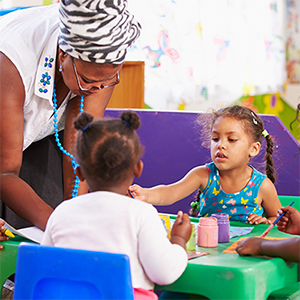
Over the 2018–19 school year, Chicago began expanding free, full-day prekindergarten (pre-K) for 3- and 4-year-olds through Chicago Public Schools (CPS). IPR developmental psychologist Terri Sabol and IPR economist Diane Whitmore Schanzenbach recently released an IPR rapid research report, "The Chicago Universal Pre-K Study: The Impact of Chicago’s Universal Prekindergarten Expansion on Access to School-Based Pre-K," examining it. The report details the impact of CPS' universal prekindergarten (UPK) expansion in its schools on capacity, enrollment, and programming. The citywide expansion was designed to start in schools in the most economically disadvantaged communities, with the goal of providing universal prekindergarten by 2023. The Office of the Mayor led the UPK initiative in partnership with the City of Chicago Department of Family Support Services (DFSS) and CPS.
Top image (Clockwise from the top left): iStock, R. Hart, iStock, R. Hart, E. Molony, Whoisjohngalt, iStock, L. McDermott
Individual article images: iStock; IPR;Whoisjohngalt; iStock; iStock; R. Hart; E. Molony; L. McDermott; L. McDermott; iStock
Published: December 12, 2023.
